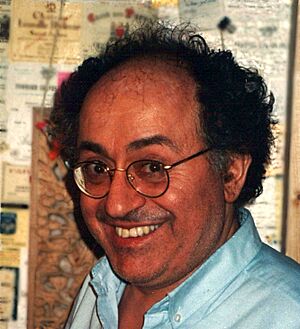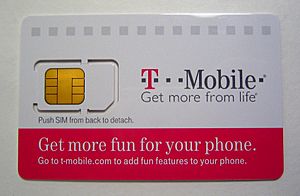Roland Moreno facts for kids
Roland Moreno (born June 11, 1945, died April 29, 2012) was a French inventor. He created the smart card, which is a small plastic card with a computer chip inside. His invention, called la carte à puce in French, became very popular in France. He was seen as a national hero and received a special award called the Légion d'Honneur in 2009.
Contents
About Roland Moreno
His Early Life and Work
Moreno was born in Cairo, Egypt, on June 11, 1945. His family moved to France when he was very young and changed their last name to Moreno. He went to schools in Paris but left early. He often said he was "self-taught" for most of his life.
After school, Moreno had several jobs. He worked as a young reporter for Détective Magazine and helped out at the L'Express news magazine. From 1970 to 1972, he was also an editor for Chimie-Actualités, a French chemistry magazine.
Creating the Smart Card
After leaving Chimie-Actualités, Moreno started his own company called Innovatron. His goal was to sell new ideas and intellectual property. He had success with a software system that mixed dictionary words to create new product or brand names for companies.
However, the smart card became Moreno's most important invention. He said he thought of the idea in a dream. He told a newspaper in 2006, "I came up with the idea in my sleep." He even gave his first smart card project a funny code name, TMR, after a movie he liked.
His first idea was for a "smart ring," a ring with a tiny computer chip inside. He filed a patent for this on March 25, 1974, when he was 29. The ring was supposed to transfer information. But this idea was not practical or popular in the 1970s.
So, Moreno made the idea simpler. In 1975, he introduced a plastic card with a microchip. He called it la carte à puce, which means "the chip card" in English. In 1976, he showed that the smart card could be used for electronic money transactions. He even used a machine he built with meccano parts!
It took about eight years for the smart card to be widely used in France because of the first costs. But in the 1980s, it became a huge success there, much earlier than in other countries. In 1983, France Télécom started using smart cards for its Télécarte pay phone cards. Nine years later, French banks put Moreno's microchip on the Carte Bleue, which was their national debit card system. Other countries like Britain and the United States were slower to use them.
Some people worried about the smart card's security and if it could be used for illegal spying. Moreno understood these concerns. In 2000, he even offered one million French francs to anyone who could break his security codes within 90 days. No one succeeded.
Even though Moreno was not famous worldwide, his invention made him very rich. His company, Innovatron, earned a lot of money from the smart card and its licenses. In 2005, Moreno said, "I can stop anyone on the street in Paris and they'll have at least three smart cards on them."
Other Inventions and Interests
Moreno loved music, broadcasting, and writing. He started an online radio station called Radio Deliro. He also invented other unique electronic devices, like le pianok, calculette, and Pièce-o'matic. Another invention was the Matapof, which could electronically copy the heads or tails game.
His Writings and Acting
Moreno wrote several books. One was Théorie du Bordel Ambiant, which was a collection of his ideas. He also wrote books using the pen name Laure Dynateur. This included a cookbook with over 2,000 recipes. He chose this name because it sounds like the French word for computer, l'ordinateur. Moreno also had small acting roles in French cinema. In the 1982 movie Les Sous-doués en vacances, he played a "mad inventor" who created a "love computer."
Moreno once said that his biggest dream was to have a wax statue of himself in the Musée Grévin, a famous wax museum in Paris.
His Family and Later Years
Roland Moreno married Stephany Stolin in December 1976. They had two daughters, Marianne and Julia. Moreno passed away in Paris on April 29, 2012, at the age of 67.
See also
 In Spanish: Roland Moreno para niños
In Spanish: Roland Moreno para niños
 | Misty Copeland |
 | Raven Wilkinson |
 | Debra Austin |
 | Aesha Ash |



